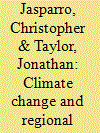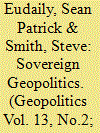|
|
|
Sort Order |
|
|
|
Items / Page
|
|
|
|
|
|
|
| Srl | Item |
| 1 |
ID:
082707


|
|
|
|
|
| Publication |
2008.
|
| Summary/Abstract |
The paper examines the Dutch humanitarian response to the 2004 Indian Ocean earthquake through the lens of geopolitics. It analyses the ways geopolitical representations shape non-state collective action, in this case the relief effort to help victims of the tsunami of 26 December 2004. Drawing on earlier work on geopolitical visions and national identity, the paper develops a framework to study people's geopolitics, the geopolitics of non-state collective actions. These insights are further explored through an examination of the Dutch tsunami relief effort. The paper discusses how the Dutch media framed this collective action as a national effort and articulated a sense of proximity and responsibility to mobilise people's generosity. Dutch geopolitical vision and national identity (water as a major threat to the national territory, the country's role as development aid donor, its relation to the regions affected) offer a frame to mobilise people. The tsunami is also analysed as a critical event for Dutch geopolitical representations and the tsunami relief effort as a peak experience providing a sense of recovered national identity in times when Dutch society was painfully divided between Muslims and non-Muslims after the murder of Theo van Gogh in November 2004. The concluding section discusses directions for further research into people's geopolitics.
|
|
|
|
|
|
|
|
|
|
|
|
|
|
|
|
| 2 |
ID:
082708


|
|
|
|
|
| Publication |
2008.
|
| Summary/Abstract |
Transnational and non-state threats including international organized crime, terrorism, illicit trafficking (in drugs, wildlife, humans, arms, etc.), piracy, infectious disease, and illegal migration flows are major concerns in Southeast Asia. This paper examines IPCC projections for climate change to the region and discusses possible impacts of these changes upon transnational security. Overall, climate change could increase potential vulnerability to various transnational security threats. Southeast Asian livelihood and social systems will be pressured, while state and civil society capacity will be strained. This will intensify existing vulnerabilities to non-state security threats and raise the overall level of vulnerability and risk to both human and state security. Predicted climate change impacts are also likely to strengthen or help revive sub-state networks that have traditionally responded to environmental change and pressure via violence, crime, smuggling, banditry, trafficking, terrorism, and other such activities. This will contribute to the evolution, expansion, and growth of "new" war fighting groups while raising overall vulnerability to non-state threats from local to global scales
|
|
|
|
|
|
|
|
|
|
|
|
|
|
|
|
| 3 |
ID:
082710


|
|
|
|
|
| Publication |
2008.
|
| Summary/Abstract |
Between the two world wars a new strain of cartography emerged in Europe, which disregarded the standards of precision of traditional geodesic, or scientific, cartography. Its scope was strictly political and its approach openly ideological. In Germany, cradle of this new genre, it was called 'geopolitische kartographie' or 'suggestive kartographie'. These terms were later borrowed from the languages of other countries where the allure of German cartography was felt. Elsewhere, in Great Britain and the United States, these maps were generally termed propaganda maps or persuasive maps.
Despite a recent rise in studies on global geopolitics during Fascism and Nazism, little attention has been devoted to the cartographic innovations of the time. Studies that have touched on this topic, mostly monographic papers, do not allow for an evaluation of possible links between earlier and later cartographic developments, or between developments occurring in different countries. This approach, which separates the phenomenon from its historical context, gives the impression that geopolitical cartography between the two world wars appeared, like a comet, out of nowhere and then simply vanished; that it was an isolated phenomenon with neither precursors nor successors.
Following World War II, geopolitical cartography was largely abandoned, presumably for the same reasons that had discredited geopolitical publications in general during the period in question: (1) the genre was considered a direct product of the propaganda machine of the dictatorial regimes; (2) it lacked scientific basis (on a par with traditional cartography); (3) it had no practical use, other than as a tool of propaganda.
This paper intends to refute these three assumptions and to shed some light on this remarkable cartographical phenomenon. What were the origins of this new way of representing space? Who used it and why?
|
|
|
|
|
|
|
|
|
|
|
|
|
|
|
|
| 4 |
ID:
082711


|
|
|
|
|
| Publication |
2008.
|
| Summary/Abstract |
This paper reconsiders the importance of the sovereign state in contemporary geopolitics. The role of the state in an era of globalisation and devolution is a concern that has gained considerable attention in recent geographical scholarship. What has received less attention is how the state has historically functioned as a device that conflated the linked concerns of sovereignty and territoriality. The authors argue that there exist a number of "sovereignty paradoxes" that inhibit the interdisciplinary analysis of the interrelations between sovereignty, territoriality, and state power. Thus, reconsidering sovereignty and territoriality informs both how the state emerged as an important unit of geographical analysis historically, and why the state has become such a problematic concept in contemporary geopolitics. This work has implications for understanding popular struggles over civil liberties, foreign policy, and justice for indigenous peoples.
|
|
|
|
|
|
|
|
|
|
|
|
|
|
|
|
| 5 |
ID:
082709


|
|
|
|
|
| Publication |
2008.
|
| Summary/Abstract |
This article uses the character of Josefvejk from the popular Czech novel The Good Soldier vejk and his Fortunes in the World War to illuminate the subversive effects of irony and self-deprecating humour on dominant geopolitical narratives. Empirically, my examples focus on the coverage of NATO invitation in major Estonian newspapers in 2002. Theoretically, these examples highlight the subtlety of resistance and the central role of irony in it. By foregroundingvejkian absurd obedience, which is nonetheless highly subversive, the article contributes to a better understanding of popular geopolitics, resistance geopolitics, and more broadly, the role of human agency in geopolitical discourses.
|
|
|
|
|
|
|
|
|
|
|
|
|
|
|
|
|
|
|
|
|